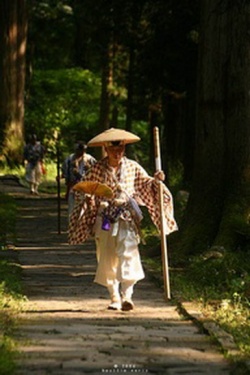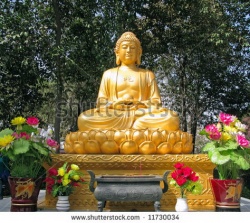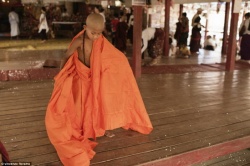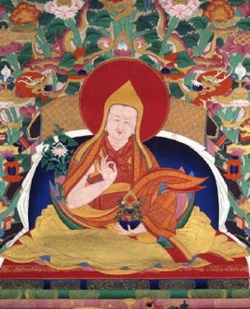The Fifth Pakpa Lha, Gyelwa Gyatso
འཕགས་པ་ལྷ ༠༥ རྒྱལ་བ་རྒྱ་མཚོ།
The Fifth Pakpa Lha, Gyelwa Gyatso
b.1644 - d.1713
TBRC P120
Incarnations
Pakpa Lha
Tradition
Geluk
Geography
Chamdo Prefecture
Historical Period
17th Century
18th Century
Institution
Ganden
Sera
Drepung Monastery
Tashilhunpo
Chamdo Jampa Ling
Offices Held
Nineteenth Throne Holder of Chamdo Jampa Ling
Name variants: blo bzang 'phags pa bsod nams lhun grub dge legs dpel bzang po; Chamdo Trirab Pakpa Lha Gyelwa Gyatso; Gyelwa Gyamtso; Lobzang Pakpa Sonam Lhundrub Gelel Pelzang
The Fifth Pakpa Lha, Gyelwa Gyatso ('phags pa lha 05 rgyal ba rgya mtsho) was born in 1644, the wood-monkey year of the 11th sexagenary cycle, in a small town called Du (sdu) in Chamdo.
His father, Orgyen Tendzin (o rgyan bstan 'dzin) was a tantric yogi of Nyingma tradition.
His mother was named Guru Tso (gu ru mtsho).
His younger brother was the Third Gyara Tulku Lobzang Puntsok Namgyel (rgya ra sprul sku 03 blo bzang phun tshogs rnam rgyal, 1646-1676), an important incarnation line of Geluk lamas in Chamdo.
He also had two sisters.
Hearing stories about auspicious circumstances surrounding the boy, the Third Zhiwa Lha, Zhiwa Zangpo (zhi ba lha 03 zhi ba bzang po, 1625-1717) and the Fourth Chakra Tulku, Choje Ngawang Trinle Zangpo,
(lcags ra sprul sku 04 ba ngag dbang phrin las bzang po, 1603-1667), directed the Solpon (the personal cook) of the late Fourth Pakpa Lha, Chokyi Gyelpo ('phags pa lha 04 chos kyi rgyal po, 1605-1643) to visit Gyelwa Gyatso and make necessary investigations to find out whether he may be the reincarnation of Pakpa Lha.
The Solpon, together with two assistants, brought several personal items of the previous Pakpa Lha, which the boy is said to have recognized. The case was then submitted to the Fourth Paṇchen Lama, Lobzang Chokyi Gyeltsen (paN chen bla ma 04 blo bzang chos kyi rgyal mtshan, 1570-1662), for his consideration.
Upon receiving the positive result from the Paṇchen Lama, in 1646, the fire-dog year of the eleventh sexagenary cycle, the two-year old Gyelwa Gyatso was escorted to Chamdo Jampa Ling (chab mdo byam pa gling), the seat of his previous incarnations.
He was given residence in Lingme College (gling smad) where he was given initial training by the Third Zhiwa Lha, who was the seventeenth abbot of the monastery.
Subsequently he was moved to the main residence of the monastery.
When the boy was about seven years old, Zhizang Rinpoche arranged for him to travel to U and Tsang for pilgrimage.
At his arrival in U, he made extensive prayers and offerings at the temples and monasteries in Lhasa and the monasteries on the outskirts such as Ganden.
The Fifth Dalai Lama Ngawang Lobzang Gyatso (ta la'i bla ma 05 ngag dbang blo bzang rgya mtsho, 1617-1682), administered his novice vows and gave the name Lobzang Pakpa Sonam Lhundrub Gelek Pel Zangpo (blo bzang 'phags pa bsod nams lhun grub dge legs dpal bzang po).
Thereafter he travelled to Tsang and met the Paṇchen Lama, who gave him novice ordination and the name Pakpa Gyelwa Gyatso ('phags pa rgyal ba rgya mtsho).
Gyelwa Gyatso also received from the Paṇchen Lama initiations and empowerments for Guhyasamāja, Cakrasaṃvara, Yamāntaka, and Mahākāla, and teachings and transmissions on various treatises.
He returned to Lhasa for more teachings from the Dalai Lama before returning to Chamdo.
In 1652, the water-dragon year of the eleventh sexagenary cycle, at the age of nine, Gyelwa Gyatso was enthroned to the abbot seat of Chamdo Jampa Ling by the Third Zhiwa Lha and Ngawang Trinle Zangpo (ngag dbang 'phrin las bzang po, b. 1607), who gave him extensive instructions.
Gyelwa Gyatso assumed the duties of his office at the age of nineteen.
At the age of twenty-one Gyelwa Gyatso travelled to Lhasa and received his full ordination from the Fifth Dalai Lama, who also bestowed him empowerment on Yamāntaka and other teachings, after which he returned to Chamdo.
Again after three years, in 1667, he travelled to Lhasa and received the audience of the Dalai Lama and made significant offerings.
He also made copious offerings at the main Geluk monasteries in U and Tsang and again returned to Kham.
Thereafter, he gave teachings and empowerments at Den Chokhor ('dan chos 'khor) while making preparation for yet another journey to Lhasa.
In 1679, at the age of thirty-six, he travelled to Lhasa and received full ordination from the Fifth Dalai Lama.
Ngawang Tendzin (ngag dbang bstan 'dzin), a former abbot, also gave him a great variety of empowerment.
Thereafter he returned to Chamdo via Kongpo, giving teachings and empowerments at monasteries along the way.
In 1684 Gyelwa Gyatso published an edition of the Kangyur (bka' 'gyur) in one hundred one volumes, printed in gold and silver, together with additional texts.
He planned to publish a set of the Tengyur (bstan 'gyur), but due to unavailability of a reliable master-copy he was unable to achieve this goal.
He expanded the monastery's assembly hall, replacing the floors on both sides of the lobby, and also commissioned new murals.
He commissioned a new large tangka of the life stories of the Buddha, and sitting-pads for the assembly hall.
He also introduced the tradition of prayer and rituals of the Medicine Buddha in the monastery.
In 1691 Gyelwa Gyatso travelled to Lhasa, and again in 1698, when he had an audience with Tsangyang Gyatso (tshang dbyangs mtsho, 1683-1706), the Sixth Dalai Lama.
He made offerings to Drepung Monastery, including a gold-wheel and white conch-shell.
Upon return to Kham, he renovated and developed some of the stupas, temples and so forth.
In his sixty-fifth year Gyelwa Gyatso desired to visit Namche Tiji (nam chi thi ji) monastery, having been invited there in the year 1705. Despite his age and ill health he made the journey, where a great deal of prayers and rituals were done for his recovery and longer life.
Gyelwa Gyatso passed away in 1713, on the second twentieth day of the tenth month of the water-snake year of the twelfth sexagenary cycle, at the age of seventy.
He sat in tukdam (thugs dam) for five weeks, during which the public was invited to view him.
Construction of a two-storey bodhi-stupa reliquary was completed in three years, made with gold plated copper and heavily ornamented with gems and precious stones.
A temple was constructed to house the stupa, in which statues of Śākyamuni Buddha, Maitreya and Amitābha were also installed.
Samten Chhosphel is an independent scholar with a PhD from the Central Institute for Higher Buddhist Studies in Sarnath, India.
Source
http://www.treasuryoflives.org/biographies/view/Fifth-Pakpa-Lha/TBRC_p120





